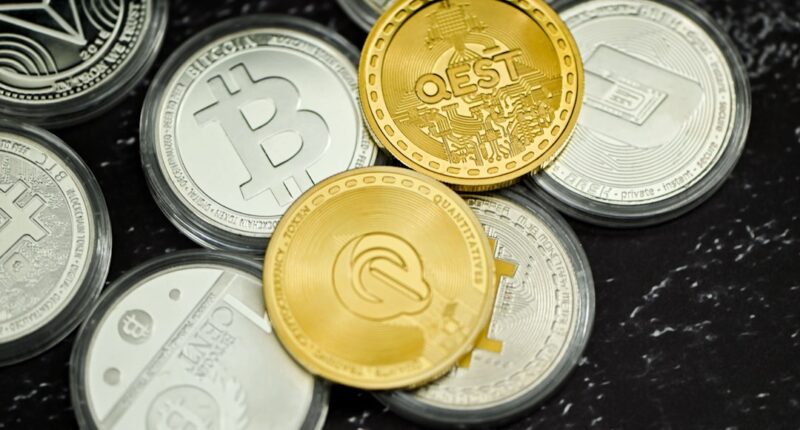The NFT market has experienced significant growth in recent years, with digital assets such as art, collectibles, and unique items selling for substantial sums. NFTs (non-fungible tokens) are blockchain-based digital assets representing ownership of specific items or content. Their popularity stems from their ability to provide verifiable ownership and scarcity in the digital realm.
The market has attracted attention from artists and collectors alike, with high-value sales garnering global media coverage. A notable trend in the NFT market is the proliferation of specialized platforms and marketplaces for buying, selling, and trading digital assets. These platforms offer diverse NFT categories, including digital art, music, videos, and virtual real estate.
The gaming industry has also shown increased interest in NFTs, with developers creating unique in-game items and experiences that can be traded as NFTs. The NFT market has also seen growing interest from traditional investors and institutions seeking to diversify their portfolios with digital assets. This increased demand has driven up prices and created new opportunities for traders.
Additionally, NFTs have become a means for direct support of artists and creators, with platforms offering exclusive content and experiences to fans. As the NFT market continues to evolve, it is crucial for traders to stay informed about the latest trends and developments to make well-informed decisions regarding NFT transactions.
Key Takeaways
- NFT market is rapidly evolving with new trends and news emerging constantly
- Potential scams and frauds are prevalent in the NFT market, requiring vigilance from buyers and sellers
- Safely buying and selling NFTs in a competitive market requires thorough research and caution
- Navigating the legal and regulatory landscape of NFT trading is essential for compliance and risk management
- Building a diverse NFT portfolio is crucial for success in a volatile market, requiring strategic planning and risk management
- Blockchain technology plays a crucial role in NFT trading, offering transparency and security for transactions
- Staying informed through resources and communities is essential for NFT traders to stay ahead of the market trends and news
Identifying Potential Scams and Frauds in the NFT Market
Fake or Plagiarized Digital Assets
One of the most common scams in the NFT market is the creation of fake or plagiarized digital assets. Scammers will create counterfeit NFTs using stolen artwork or content, and then try to sell them to unsuspecting buyers.
Fraudulent Marketplaces and Misleading Information
Additionally, there have been cases of scammers creating fake marketplaces or platforms in order to trick traders into buying non-existent NFTs. Another potential scam in the NFT market is the use of misleading or false information to manipulate prices. This can include false claims about the rarity or authenticity of an NFT, as well as artificially inflating prices through fake bids or purchases.
Protecting Yourself from Scams and Frauds
In order to protect themselves from potential scams and frauds in the NFT market, traders should take steps to verify the authenticity of any NFT before making a purchase. This can include researching the history of the item, verifying the identity of the seller, and using reputable marketplaces and platforms. Additionally, traders should be cautious of any offers that seem too good to be true, and should never reveal their private keys or other sensitive information to anyone. By staying informed and being vigilant, traders can protect themselves from potential scams and frauds in the NFT market.
Tips for Safely Buying and Selling NFTs in a Competitive Market

The NFT market is highly competitive, with traders vying for unique digital assets and opportunities. In order to safely buy and sell NFTs in this competitive market, it is important for traders to do their due diligence and research before making any purchases. This can include researching the history of an NFT, verifying the authenticity of the item, and understanding the reputation of the seller.
Additionally, traders should be cautious of any offers that seem too good to be true, and should never reveal their private keys or other sensitive information to anyone. Another tip for safely buying and selling NFTs in a competitive market is to use reputable marketplaces and platforms. There are a wide range of platforms dedicated to buying, selling, and trading NFTs, each with their own features and benefits.
By using reputable platforms with strong security measures in place, traders can reduce their risk of falling victim to scams or frauds. Additionally, using reputable platforms can provide traders with access to a wider range of NFTs and opportunities, helping them stay ahead in the competitive market. In addition to doing their due diligence and using reputable platforms, traders should also consider diversifying their NFT portfolio as a way to reduce risk.
By investing in a variety of digital assets across different categories and platforms, traders can spread their risk and increase their chances of success in the competitive market. This can include investing in digital art, music, videos, virtual real estate, and other unique assets. By following these tips for safely buying and selling NFTs in a competitive market, traders can protect themselves from potential scams and frauds while maximizing their opportunities for success.
Navigating the Legal and Regulatory Landscape of NFT Trading
As the NFT market continues to grow, it has also attracted the attention of regulators and lawmakers looking to establish legal frameworks for trading digital assets. One of the key legal considerations for NFT trading is intellectual property rights. Traders should be aware of copyright laws and other intellectual property regulations when buying and selling digital art or other content as NFTs.
Additionally, there may be legal considerations related to licensing agreements or royalties when trading certain types of digital assets. Another legal consideration for NFT trading is tax implications. Depending on the jurisdiction, traders may be required to pay taxes on any profits made from buying and selling NFTs.
It is important for traders to understand their tax obligations and seek professional advice if necessary in order to comply with local tax laws. Additionally, there may be legal considerations related to money laundering or fraud when trading high-value digital assets. In order to navigate the legal and regulatory landscape of NFT trading, it is important for traders to stay informed about the latest developments in laws and regulations related to digital assets.
This can include staying up-to-date on changes in intellectual property laws, tax regulations, and anti-money laundering requirements. Additionally, traders should seek professional advice if they have any questions or concerns about the legal implications of trading NFTs. By staying informed and seeking professional advice when necessary, traders can navigate the legal and regulatory landscape of NFT trading with confidence.
Building a Diverse NFT Portfolio: Strategies for Success in a Volatile Market
The NFT market is known for its volatility, with prices fluctuating rapidly based on demand and other factors. In order to succeed in this volatile market, it is important for traders to build a diverse NFT portfolio that includes a variety of digital assets across different categories and platforms. By diversifying their portfolio, traders can spread their risk and increase their chances of success in the competitive market.
This can include investing in digital art, music, videos, virtual real estate, gaming items, and other unique assets. Another strategy for success in a volatile market is to stay informed about the latest trends and news in the NFT market. By staying informed about changes in demand, new opportunities, and emerging trends, traders can make informed decisions about buying and selling NFTs.
Additionally, staying informed can help traders identify potential scams or frauds in the market, protecting them from falling victim to fraudulent schemes. In addition to building a diverse portfolio and staying informed about the latest trends and news, traders should also consider setting clear investment goals and strategies. This can include setting a budget for investing in NFTs, establishing criteria for evaluating potential purchases, and setting realistic expectations for returns on investment.
By following these strategies for success in a volatile market, traders can maximize their opportunities for success while minimizing their risk.
The Role of Blockchain Technology in NFT Trading: What You Need to Know

Secure Ownership and Scarcity
Each NFT is stored on a blockchain as a unique token that represents ownership of a specific item or piece of content. This provides proof of ownership and scarcity in the digital world, making it possible for traders to buy, sell, and trade unique digital assets with confidence.
Transparency and Security in Transactions
One of the key benefits of blockchain technology in NFT trading is its ability to provide transparency and security throughout the entire transaction process. Each transaction is recorded on a public ledger that is accessible to anyone, providing a transparent record of ownership transfers and sales history. Additionally, blockchain technology uses strong encryption methods to secure transactions and prevent unauthorized access or tampering.
Enabling Smart Contracts
Another important aspect of blockchain technology in NFT trading is its ability to enable smart contracts. Smart contracts are self-executing contracts with the terms of the agreement directly written into code. This allows for automated transactions based on predefined conditions, providing a secure way for buyers and sellers to exchange digital assets without the need for intermediaries.
Empowering Informed Trading Decisions
By understanding the role of blockchain technology in NFT trading, traders can gain a deeper appreciation for the security and transparency provided by this innovative technology. Additionally, understanding blockchain technology can help traders make informed decisions about buying and selling NFTs with confidence.
Staying Informed: Resources and Communities for NFT Traders
Staying informed about the latest trends and news in the NFT market is crucial for success as a trader. There are a wide range of resources and communities dedicated to providing information and support for NFT traders. One valuable resource for staying informed is online forums and communities dedicated to discussing NFT trading.
These forums provide a platform for traders to share insights, ask questions, and stay updated on the latest developments in the market. Another valuable resource for staying informed about NFT trading is industry news websites and publications. These sources provide up-to-date information about new opportunities, emerging trends, high-profile sales, and other important developments in the market.
Additionally, many industry news websites offer analysis and commentary from experts in the field, providing valuable insights for traders. In addition to online forums and industry news websites, there are also educational resources available for traders looking to learn more about NFT trading. This can include online courses, webinars, tutorials, and other educational materials that provide valuable information about buying, selling, and trading digital assets as NFTs.
By taking advantage of these resources and communities dedicated to supporting NFT traders, individuals can stay informed about the latest trends and news while connecting with other like-minded individuals who share their passion for digital assets. In conclusion, the NFT market offers exciting opportunities for traders looking to invest in unique digital assets. By understanding the latest trends and news in the market, identifying potential scams and frauds, safely buying and selling NFTs in a competitive market, navigating the legal landscape of trading digital assets, building a diverse portfolio with strategies for success in a volatile market, understanding blockchain technology’s role in NFT trading, staying informed through resources and communities dedicated to supporting NFT traders – individuals can position themselves for success while minimizing risks associated with this emerging market.
FAQs
What is an NFT?
An NFT, or non-fungible token, is a digital asset that represents ownership or proof of authenticity of a unique item or piece of content, such as artwork, music, videos, or collectibles, using blockchain technology.
How do you trade NFTs?
To trade NFTs, you can use online marketplaces or platforms that support NFT transactions. You will need a digital wallet to store your NFTs and cryptocurrency to purchase them. Once you have these, you can buy, sell, or trade NFTs with other users on these platforms.
What are the risks of trading NFTs?
The NFT market can be volatile, and there are risks of scams, fraud, and market manipulation. Additionally, the value of NFTs can fluctuate, and there is no guarantee of returns on investment.
How can you avoid scams and fraud when trading NFTs?
To avoid scams and fraud when trading NFTs, it is important to research the platforms and marketplaces you use, verify the authenticity of the NFTs you are interested in, and be cautious of deals that seem too good to be true. It is also recommended to use secure and reputable digital wallets and to be wary of phishing attempts and fraudulent schemes.
What are some best practices for trading NFTs?
Some best practices for trading NFTs include doing thorough research on the NFTs and the market, diversifying your NFT portfolio, setting a budget and sticking to it, and staying informed about the latest trends and developments in the NFT space. It is also important to be cautious and to only invest what you can afford to lose.





